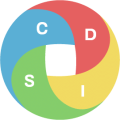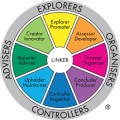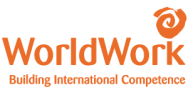
Methods & Tools
Like a cabinet-maker using wood species of various colors to create inlayed furniture, Ressources & Talents has developed expertise in selecting various approaches and tools to best respond to customers’ needs and corporate culture – like crafting a unique masterpiece to serve your needs!

NPL or Neuro-Linguistic Programming
NLP is a set of methodologies, techniques and strategies for modeling excellence, in order to help us better understand how our thought processes and behaviors, including the language we use, influences the way we think and the results we get. Modeling excellence in any field enables us to bring about a positive change in ourselves and in others.

Cooperative Systemic Approach
This approach takes its sources from the different schools of systemic thinking. It focuses on building a cooperative link between the coachee and the coach, using the expertise of the coachee on his/her issues. The coach is there to build a frame helping the coachee to feel comfortable to change or to redefine his/her situation and problem.

Eric Berne Theory of Organization
Eric Berne, founder of Transactional Analysis (TA), has studied the application of his theory to organizations. It is a great tool to analyze the way of working of any group, entity, and organization. It highlights the areas of dysfunction, and possible levers for action.

Clean Langage and Metaphors
David Groove created this specific way of questioning. He found it was beneficial to focus attention on the metaphors people use naturally to describe their experience. Metaphors generally operate at an unconscious level and, by paying attention to them, people can gain access to a deeper and embodied level of experience: the structure of their thinking; the patterns that run their lives; their truth. Asking clean questions, using the client’s own words and exploring metaphors are just a few of the things a clean facilitator can do to encourage the conditions for sustainable change.

Generative Coaching
Generative coaching has been defined by R. Dilts and S. Gillighan as a third generation of change work. It includes most of the basic principles and methods of traditional coaching—an emphasis on positive goals, future orientation, and action plans—but also gives major attention to a person’s state of consciousness, including their negative emotional states. Emphasizing the “inner game” of a person’s performance as equally important as their outer life allows new possibilities to emerge. Most important, its primary goal is to connect clients with the creative consciousness needed to generate a happy, successful, and meaningful life.

Somatic Coaching
Somatic coaching is based on movement, intuition and spontaneity. Whatever activity is proposed to a client, the aim is to make him/her go through a physical experience linked to his/her problem. Moving one’s body allows to connect to perceptions, and a better self-consciousness. All difficulties, blockages, emotions are present in the body. When you express them with movement, you can find new options and resources. It is often quicker than when you use words.

Assessments24x7
This tool is based on the Winton Moulton Marston theory. Different versions exist on the market today (DISC, 4 colors test, etc.). It focuses on personal preferences of behaving, based on how we decipher our environment. It is a simple and powerful tool to illustrate that there are many different ways of behaving, based on individual preferences. And it gives keys to adapt our communication to better work with others.

Team Management Profile (TMSDI)
This test provides individuals with an easy-to-understand framework that explains how people work together effectively, solve problems and provide leadership. It is inspired by C.G. Jung work. It has great application for teams to analyze the preferred roles of each member and help adjust its way of working. It is also very relevant for transversal teams starting new projects.
®reproduced by kind permission of TMS Development International Ltd, 2020

The International Profiler
The International Profiler is a strategically designed tool that helps people adapt to working in a global environment. It has been meticulously crafted to enable people to breach the cultural wall that so often hinders success when conducting business on an international or global level. People who complete the International Profiler process will become more self-aware and will be able to adopt behavioural strategies appropriate for the particular intercultural context that they are currently working in – or that they will be working in.

Human Synergistics tools
The Human Synergistics tools provide a way to see, measure, and change the thinking and behavioral styles proven to drive the performance of not only individuals, but also groups and organizations. The proposed tools can be used for individuals (LSI, LI), including a 360° option for teams (GSI) and for organizations (OCI). Results are displayed on a Circumplex—the same graph utilized for leaders, team assessments and culture assessment —providing a common language and visual to cascade across all organizational levels.

Extraordinary Leaders
The 360° tools and coaching process proposed by Zenger Folkman help to discover and develop leadership strengths that empower people and organizations. Great leaders are not defined by the absence of weakness, but rather they possess a handful of profound strengths. This is the cornerstone of this tool, proved by intensive research. Focusing on developing strengths, (thus extraordinary leaders) has an impact on team engagement, client satisfaction and overall performance

WorkPlaceBigFive
The WorkPlace Big Five Profile™ is a psychometric test, which reveals an individual’s 5 personality supertraits and 23 subtraits that simply and clearly explain work-related behaviors found in day-to-day encounters with coworkers, employees, managers and colleagues. It has been developed based on semantic analysis. The 5 supertraits are: Need for stability (degree to which we respond to stress), Extraversion (degree to which we tolerate sensory stimulation), Originality (degree to which we are open to new experience), Accommodation (degree to which we defer to others), Consolidation (degree to which we push towards goals).

FIRO-B
The Fundamental Interpersonal Relations Orientation™ (FIRO®) assessments help people understand their interpersonal needs and how those needs influence their communication style and behavior. It provides critical data on how people tend to behave toward others and how they want others to behave toward them. Based on the work of Will Schutz, these assessments facilitate behavioral change by providing insight into people’s working relationships and requirements on 3 needs: inclusion, control and affection.

